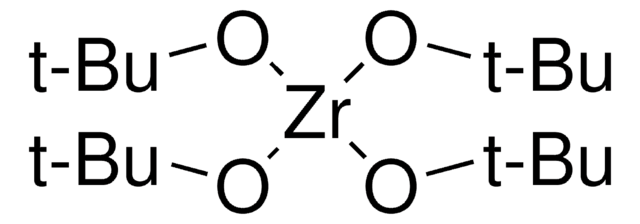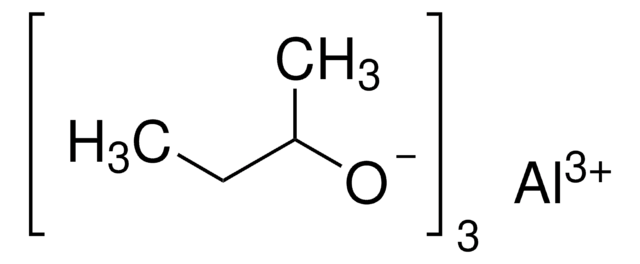333972
Zirconium(IV) propoxide solution
70 wt. % in 1-propanol
Synonym(s):
Tetrapropyl zirconate
About This Item
Recommended Products
form
solution
Quality Level
composition
Zr, 18.1-22.3% gravimetric
reaction suitability
core: zirconium
reagent type: catalyst
concentration
70 wt. % in 1-propanol
refractive index
n20/D 1.451
bp
208 °C/0.1 mmHg
density
1.044 g/mL at 25 °C
SMILES string
CCCO[Zr](OCCC)(OCCC)OCCC
InChI
1S/4C3H7O.Zr/c4*1-2-3-4;/h4*2-3H2,1H3;/q4*-1;+4
InChI key
XPGAWFIWCWKDDL-UHFFFAOYSA-N
Looking for similar products? Visit Product Comparison Guide
Application
Signal Word
Danger
Hazard Statements
Precautionary Statements
Hazard Classifications
Eye Dam. 1 - Flam. Liq. 3 - STOT SE 3
Target Organs
Respiratory system
Storage Class Code
3 - Flammable liquids
WGK
WGK 3
Flash Point(F)
82.9 °F - closed cup
Flash Point(C)
28.3 °C - closed cup
Personal Protective Equipment
Choose from one of the most recent versions:
Already Own This Product?
Find documentation for the products that you have recently purchased in the Document Library.
Customers Also Viewed
Articles
From Form to Function: Molding Porous Materials in Three Dimensions by Colloidal Crystal Templating
Among various ceramics, one-dimensional (1-D) piezoelectric ceramics have attracted significant scientific attention for use in energy harvesting.
The properties of many devices are limited by the intrinsic properties of the materials that compose them.
Our team of scientists has experience in all areas of research including Life Science, Material Science, Chemical Synthesis, Chromatography, Analytical and many others.
Contact Technical Service













